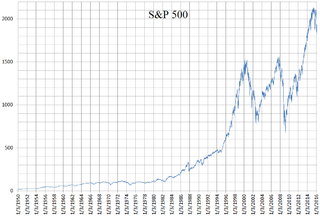
Finance is the study and discipline of money, currency and capital assets. It is related to, but not synonymous with economics, which is the study of production, distribution, and consumption of goods and services; the discipline of financial economics bridges the two. Financial activities take place in financial systems at various scopes; thus, the field can be roughly divided into personal, corporate, and public finance.
Passive management is an investing strategy that tracks a market-weighted index or portfolio. Passive management is most common on the equity market, where index funds track a stock market index, but it is becoming more common in other investment types, including bonds, commodities and hedge funds.

Dow Jones & Company, Inc. is an American publishing firm owned by News Corp and led by CEO Almar Latour.
An index fund is a mutual fund or exchange-traded fund (ETF) designed to follow certain preset rules so that it can replicate the performance ("track") of a specified basket of underlying investments. While index providers often emphasize that they are for-profit organizations, index providers have the ability to act as "reluctant regulators" when determining which companies are suitable for an index. Those rules may include tracking prominent indexes like the S&P 500 or the Dow Jones Industrial Average or implementation rules, such as tax-management, tracking error minimization, large block trading or patient/flexible trading strategies that allow for greater tracking error but lower market impact costs. Index funds may also have rules that screen for social and sustainable criteria.

The Standard and Poor's 500, or simply the S&P 500, is a stock market index tracking the stock performance of 500 of the largest companies listed on stock exchanges in the United States. It is one of the most commonly followed equity indices. As of December 31, 2021, according to surveys, more than $7.1 trillion was invested in assets tied to the performance of the index.
An exchange-traded fund (ETF) is a type of investment fund and exchange-traded product, i.e. they are traded on stock exchanges.
A financial analyst is a professional, undertaking financial analysis for external or internal clients as a core feature of the job. The role may specifically be titled securities analyst, research analyst, equity analyst, investment analyst, or ratings analyst. The job title is a broad one: in banking, and industry more generally, various other analyst-roles cover financial management and (credit) risk management, as opposed to focusing on investments and valuation; these are also discussed in this article.
Active management is an approach to investing. In an actively managed portfolio of investments, the investor selects the investments that make up the portfolio. Active management is often compared to passive management or index investing.
The Dow Jones Islamic Market Index (DJIM), launched in 1999 in Bahrain, was the first index created for investors seeking investments in compliance with Muslim Sharia law.
The Nasdaq Composite is a stock market index that includes almost all stocks listed on the Nasdaq stock exchange. Along with the Dow Jones Industrial Average and S&P 500, it is one of the three most-followed stock market indices in the United States. The composition of the NASDAQ Composite is heavily weighted towards companies in the information technology sector. The Nasdaq-100, which includes 100 of the largest non-financial companies in the Nasdaq Composite, accounts for over 90% of the movement of the Nasdaq Composite.

Socially responsible investing (SRI), social investment, sustainable socially conscious, "green" or ethical investing, is any investment strategy which seeks to consider both financial return and social/environmental good to bring about social change regarded as positive by proponents. Socially responsible investments often constitute a small percentage of total funds invested by corporations and are riddled with obstacles.
The S&P/ASX 300, or simply, ASX 300, is a stock market index of Australian stocks listed on the Australian Securities Exchange (ASX). The index is market-capitalisation weighted, meaning each company included is in proportion to the indexes total market value, and float-adjusted, meaning the index only considers shares available to public investors.
Markov Processes International, Inc. (MPI) Is a provider of investment research, analytics and technology, used by organizations throughout the financial services industry, including: alternative research groups, hedge funds, hedge fund of funds, family offices, institutional investors, consultants, private banks, asset managers, investment advisors and private wealth professionals.

S&P Dow Jones Indices LLC is a joint venture between S&P Global, the CME Group, and News Corp that was announced in 2011 and later launched in 2012. It produces, maintains, licenses, and markets stock market indices as benchmarks and as the basis of investable products, such as exchange-traded funds (ETFs), mutual funds, and structured products. The company currently has employees in 15 cities worldwide, including New York, London, Frankfurt, Singapore, Hong Kong, Sydney, Beijing, and Dubai.
The Dow Jones Sustainability Indices (DJSI) launched in 1999, are a family of indices evaluating the sustainability performance of thousands of companies trading publicly, operated under a strategic partnership between S&P Dow Jones Indices and RobecoSAM of the S&P Dow Jones Indices. They are the longest-running global sustainability benchmarks worldwide and have become the key reference point in sustainability investing for investors and companies alike. In 2012, S&P Dow Jones Indices was formed via the merger of S&P Indices and Dow Jones Indexes.

In finance, a stock index, or stock market index, is an index that measures the performance of a stock market, or of a subset of a stock market. It helps investors compare current stock price levels with past prices to calculate market performance.

Robeco Schweiz is an international investment company with a specific focus on sustainability investments. It was founded in 1995 by Reto Ringger. The company is based in Zurich, Switzerland, and considers economic, environmental, and social criteria in its investment strategies. In addition to asset management, the company has an indexes and private equity portion of the business. In 2006 RobecoSAM introduced a division called sustainability services that provides sustainability benchmarking reports to companies. In 2001, the then-RobecoSAM became the first carbon neutral company in Switzerland.
Quantitative analysis is the use of mathematical and statistical methods in finance and investment management. Those working in the field are quantitative analysts (quants). Quants tend to specialize in specific areas which may include derivative structuring or pricing, risk management, investment management and other related finance occupations. The occupation is similar to those in industrial mathematics in other industries. The process usually consists of searching vast databases for patterns, such as correlations among liquid assets or price-movement patterns.

Mathematical finance, also known as quantitative finance and financial mathematics, is a field of applied mathematics, concerned with mathematical modeling of financial markets.
Style drift occurs when a mutual fund's actual and declared investment style differs. A mutual fund’s declared investment style can be found in the fund prospectus which investors commonly rely upon to aid their investment decisions. For most investors, they assumed that mutual fund managers will invest according to the advertised guidelines, this is however, not the case for a fund with style drift. Style drift is commonplace in today’s mutual fund industry, making no distinction between developed and developing markets according to studies in the United States by Brown and Goetzmann (1997) and in China as reported in Sina Finance.





